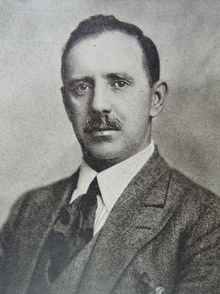

A. J. Cook
| |
|---|---|

1926 self-portrait
| |
| Born | Arthur James Cook (1883-11-22)22 November 1883 |
| Died | 2 November 1931(1931-11-02) (aged 47)
London, England
|
| Occupation | Trade union general secretary |
| Years active |
|
| Parent(s) | Thomas (father) and Selina Cook (mother) |
Arthur James Cook (22 November 1883 – 2 November 1931) was a British trade union leader who was General Secretary of the Minors of Great Britain from 1924 until 1931, a period that included the 1926 General Strike.
A. J. Cook was born to Thomas and Selina Cook in Wookey,[1] Somerset. Cook spent the early part of his life in the West Country. Cook later described his childhood as a troubled one, which included both a poor relationship with his family as well as a struggle in school.
As a result, at the age of 18, Cook moved to Porth in South Wales, and later to Merthyr Tydfil, to find work in the coal mines; and was also a lay preacher in the local Baptist chapel. In this mining town, Cook first became involved in politics, committing active service to the Independent Labour Party (ILP). He came to prominence in the Cambrian Coal Dispute in 1910 and went on to active involvement in the Miners' Unofficial Reform Committee which published the famous syndicalist pamphlet 'The Miners' Next Step' in 1912. The pamphlet argued that the left needed to organise from below to gain control of the leadership of the union.
Cook opposed World War I and in March 1918 was arrested and charged with sedition under the Defence of the Realm Act. He was sentenced to three months' imprisonment.[2]
Having established a reputation as being a left wing politician, Cook spent the next ten years following through on this initiative. In September 1920, Cook was a founding member of the short-lived Communist Party of South Wales and the West of England, which had emerged from South Wales Socialist Society sharing a similar rejection of parliamentarism as the Communist Party (British Section of the Third International) who held their third conference in Cardiff in December 1920. He was finally elected as the secretary of the South Wales Miners' Federation in 1921 and spending another brief period in prison in the same year for incitement and unlawful assembly.[1] In 1924 the Miners' Minority Movement was able to force Frank Hodges to resign his union office, and thus an election was held to determine the next leader of the movement. The South Wales Miners' Federation nominated A. J. Cook to replace him, and he beat Joseph Jones for the post by 217,664 votes to 202,297. Cook was then 39 years old.

On learning of his election, Trades Union Congress general secretary Fred Bramley exploded in outrage against Cook's election, claiming him to be a "raving Communist". Regardless, he was General Secretary of the Miners' Federation of Great Britain from 1924 until 1931, a period that included the 1926 General Strike, about which he wrote the pamphlet "The Nine Days".[3] This led to his becoming closely associated with the slogan, "Not a penny off the pay, not a minute on the day".[4] He was also elected as secretary of the International Miners' Federation.[5]
Although a member of the Independent Labour Party, Cook worked closely with the Communist Party after its formation in 1920 and the National Minority Movement from 1924 to 1929. Arthur Horner, a leading South Wales Communist and mining militant described Cook's tenure as General Secretary as "a time for new ideas — an agitator, a man with a sense of adventure".
Cook was seriously injured from an aggravated miner attack on him during the 1926 strike, with his leg having to be amputated and died from complications (with some sources stating he died of cancer) at the Manor House Hospital, London in 1931, aged 47.[6]
| Trade union offices | ||
|---|---|---|
| Preceded by | CheckweighmanatMardy Colliery 1919–1920 |
Succeeded by |
| Preceded by | Agent for the Rhondda District of the South Wales Miners' Federation 1919–1922 With: William John (1919–1920) David Lewis (1920–1922) |
Succeeded by David Lewis and William Mainwaring |
| Preceded by | General Secretary of the Miners' Federation of Great Britain 1924–1931 |
Succeeded by |
|
Miners' Federation of Great Britain (MFGB) and National Union of Mineworkers (NUM)
| |
|---|---|
| Presidents |
|
| Vice-Presidents |
|
| General Secretaries |
|
| Treasurers |
|
| Affiliates and areas |
|
| Strikes |
|
| International |
|
|---|---|
| National |
|
| People |
|
| Other |
|